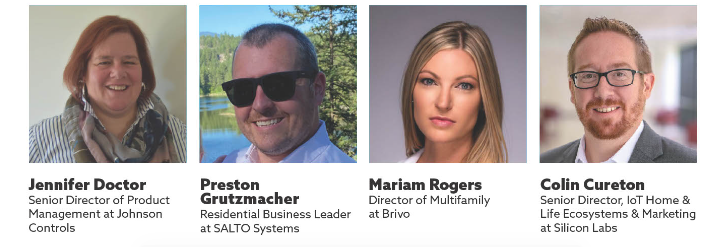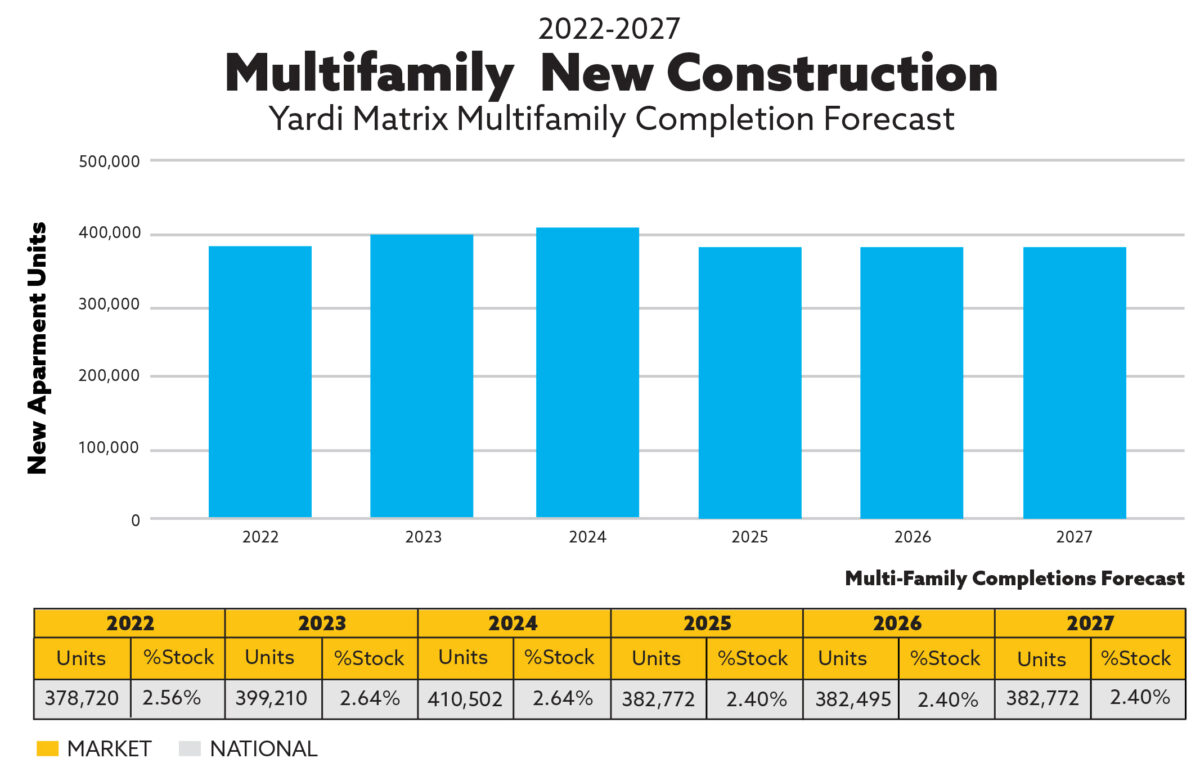Considerations When Entering the Multi-Family Market

[Full Video of Interview on Security Nation Podcast is Below]
During the COVID-19 pandemic many industries experienced a recession of technology and growth. Fortunately, the security industry and more specifically, the MDU (Multi-Dwelling Unit) vertical was one of the exceptions. The Electronic Security Expo in June 2022 hosted a peer-to-peer education session “Top 5 factors you need to know before entering the MDU market”, that explored the MDU market’s latest trends, go-to-market strategies, and what makes it a unique vertical in our industry. This session was led by 4 presenters with each offering a unique industry perspective.
Growth & Trends in the MDU (Multi Dwelling Units) Market
The presentation began with taking a closer look at the latest MDU market trends. At the beginning of the year, Yardie Matrix published an article regarding new construction permits that are being pulled. It shows that there is a steady trend for the next five years with an average of almost 4000 units being built, which is astronomical. “It is also important to note that more people start renting when there is a recession.” says Mariam Rogers “So, it is great to see that the MDU marketing has sustained throughout the pandemic, and it is still growing steadily. It really is a recession-proof vertical.” Rogers adds.
Additionally, the presenters discussed how apartment operators are getting smarter and more creative. For example, some developments might be running a building that’s 90% traditional apartments and then 20% that are co-living.
“There is just this incredible amount of diversity that is starting to happen in the multifamily market.” says Preston Grutzmacher “Once there is a diverse population in buildings with totally different use cases, then the demand for technology grows as well.”
Jennifer Doctor then explained that historically in the MDU market, any kind of multi-dwelling unit had three elements; the property automation itself, the resident amenities and automation, and the building security. “Before the last three years or so, these elements were treated as separate components in the environment. Now we are seeing them merge into one solution request. That’s really where the true growth is for our industry.”
Market Strategies to Motivate Buyers
After going over the MDU market’s growth potential and trends, the discussion moved into go-to-market strategies. They explained how marketing efforts have been changing over the years. If you were to rewind the clock in the security industry ten years, your marketing spend would have been directed entirely towards a security reseller. But in more recent years there has been a need to bring qualified leads to your channel partners and keep their business going. One of the ways that you can do that is by marketing to the different types of organizations inside of multifamily. Marketing to developers, investors, and to general contractors. Because the more excitement that you can build with those organizations, the more demand you can create to supply your channel partners. “Remember, there’s an entirely different set talk tracks when it comes to communicating the products to each of your different audience members.” Grutzmacher advises
“If you’re talking to a property manager, their needs are different from the leasing agent, from the developer, from the owner, and you must start asking yourself, ‘Who are our customers?’ – For dealers entering the market, don’t write anyone off. Your next sale could come from a ton of diverse groups within any property.” Grutzmacher continues.
Doctor added that during those conversations about the types of buildings with different audiences on value, you must keep the end user adoption and what their needs are front of mind. “If you’re in an apartment with a month-to-month rental, the products you bring in are potentially different from those of a condominium. Plus, all of that can change if you’re in a multi-unit dwelling that caters to a senior citizen environment.” explains Doctor. Essentially, you must be able to adjust your talking based on all these audiences to truly present your value and what makes you unique and the better solution. “It’s not the product. We can all build the products, it’s the conversations of how to present them.” Doctor adds
How Does Managed Wifi Fit in the Picture?
This portion of the presentation explored managed WiFi solutions. Grutzmacher pointed out, if a building has managed WiFi, with each residential unit is charged $20 from their ISP, but they’re selling the WiFi to each individual resident at $50. That’s created $30 of RMR per unit that they never had before. “Managed WiFi is the next frontier in prop TAC for multifamily. When we get to the world of managed WiFi, all of a sudden that property has a revenue source.” says Grutzmacher.
From there Rogers added that every tech stack must have a network that is reliable. Residents want to be able to make phone calls in the elevator or parking garages without them dropping. Without the proper infrastructure that all the technology is layered on, connections will fail. “If you start looking at things like Smart Appliances that are running on WiFi, there must be a backbone to keep everything, and everyone connected. That’s where managed WiFi is a great solution. You use systems that have a cellular backhaul and if the celluar connection isn’t stable and there’s no WiFi, you’ve got to get very creative with your design or you’re going to have a lot of unhappy customers.” says Rogers
First Step… Find a trusted partner
During the question-and-answer porting of the ESX education session, an attendee asked for what one’s first step should be when entering the MDU market. The presenters all concur that everyone should start by finding a trusted partner. Doctor cautioned that if your first partner is not one that you totally trust and feel has your back, then you need to go with someone else and trust your intuition. “Not all partners will put your interest before their wallet. You need somebody at the very beginning that is going to help you go through this process as a team to help your goals, not theirs.” explains Doctor
Rogers challenged those entering the MDU market to ask potential partners a set of questions to ensure that they are legitimate and have industry knowledge.
- Is the partner SOC compliant?
- How long has the partner been in business?
- Is the partner working from a startup fund or are they operating in the black?
“You can’t rely on everyone that’s selling to you to be an expert on all things technology. You need to partner with people who understand the whole tech stack and the multifamily ecosystem as a whole.” cautions Rogers.
In the session’s closing the presenters remarked on the Electronic Security Assocation’s role to educate integrators and channel partners and make sure that the industry is on the same page and understands how unique multifamily is.
“ESA in terms of helping present the education and building awareness is beyond necessary right now for the industry. They are finding ways to present the specific nuances of the different markets too. ESA and this event the Electronic Security Expo (ESX) has the voice and the authority to do this and help all of us and we appreciate everything they do every day.” says Doctor
If you find this peer-led education format beneficial to your security business, make sure to register to ESX 2023. It will be held June 5-8 at the Kentucky International Convention Center in Louisville, Kentucky.




